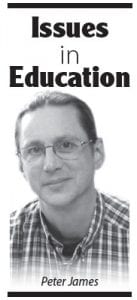There is a saying that basketball teams are made from November to March, but that basketball players are made from March to November. It expresses the shifting balance between the development of individual skills and the application of those skills in specific settings or toward specific goals. Schools are specific settings and academic standards with specific goals in the application of learning, but they are not the most important aspects of it.
We have all learned much more than we obtained during our schooling, and we have applied our knowledge and skills in solving many more problems than those presented on standardized tests. The fact that school is not in session should not mean that we expect learning should stop, but rather that we enjoy opportunities for new, engaging, and multi-faceted learning to occur. Making the most of this off season is the best way to ensure students find success when school resumes in the fall.
Of course, there are formal learning opportunities in the summer as well, including many different camps, Community Education programs, and local courses offered through the Art Colony, North House Folk School, and others. In addition, our county is rich with resources for learning, including the North Shore Commercial Fishing Museum, Cook County Historical Society Museum, Johnson Heritage Post, Grand Portage National Monument, Chik-Wauk Museum, Sugarloaf Cove, and several state parks with interpretive centers and naturalist programs. You could easily fill an entire summer with just the opportunities these provide.
Yet summer is perhaps primarily a time for loosely structured exploration and discovery. There is tremendous value in helping kids pursue their individual interests and supporting their investigations into new levels of understanding— and I don’t mean the next level in their favorite video game! We need to practice the skills of learning by moving beyond what is familiar and comfortable to us.
Whether “outdoors” in your family means the backyard or the Boundary Waters, our natural world offers countless opportunities for inquiry. Everyone should be out making observations and asking questions about the marvelous place we live. And don’t expect to have all the answers! Helping children learn does not mean telling them what we know, but rather engaging them in meaningful conversation about their questions and showing them ways to investigate further.
This approach can be applied in almost every setting. Whether you are taking children to the lake, to the city, to the harbor, to a concert, or just to the garden out back, there are opportunities to see new things and explore them. Family gatherings are great times for children to hear the stories of their ancestors, heritage, and history. Rainy days spent playing cards or board games can strengthen relationships as well as intellectual skills. Car rides can be filled with interactive games of 20 questions, Billboard Bingo, or I-Spy that develop observation, communication, and thinking abilities. Serving others through church or community initiatives helps children experience the interconnectedness of society and see themselves in a new relationship with it.
In all these situations, for better or worse, how you engage with the world and people around you sets an example for the children in your lives. Demonstrating an interest in new things, working on projects or chores together, wondering aloud about things you see, modeling your love of a particular hobby, reading and discussing favorite books, or sharing your memories and family stories all send a message that learning is important to you and happening everywhere, all the time.
Children are born learners. They are curious about their surroundings and eager to develop relationships with those they meet. To help them grow to become life-long learners, we need to encourage their curiosity and engage in healthy relationships with them. There is an important role for public education in this process, and each of us in the public education system focuses on filling that role to the best of our ability. However, when people view learning as confined to the schoolhouse and directed only by teachers, they miss the essence of life-long learning, which is about the learner, not the lessons.
Each of us can provide children with opportunities to see themselves as capable learners, engaged thinkers, and creative problem-solvers. Keeping the spark of curiosity alive, we can help them develop the knowledge and skills to be successful not only in school, but in the world. That’s the real goal of public education, and the learning that takes place when students are away from school is a key factor in achieving it.
Each month a representative of our local schools will offer thoughts in Issues in Education. This month’s s contributor is Peter James, director of Great Expectations School.



Loading Comments